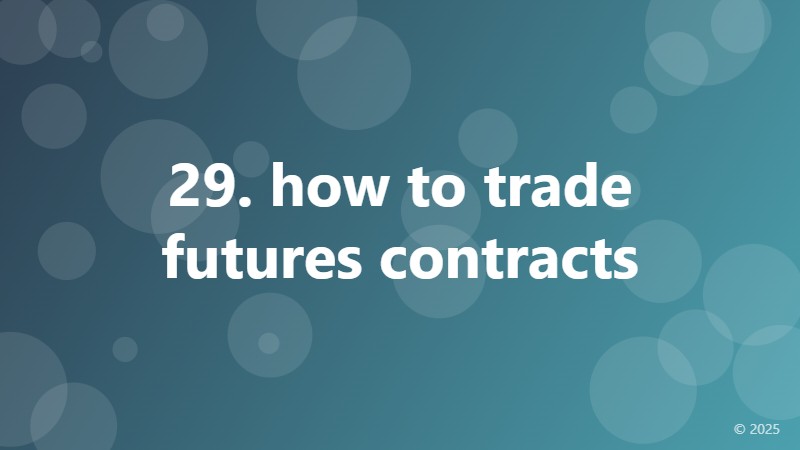29. how to trade futures contracts

Understanding Futures Contracts: A Beginner's Guide
Trading futures contracts can be a lucrative venture, but it's essential to understand the basics before diving in. In this article, we'll take you through the process of how to trade futures contracts, covering the essential concepts, benefits, and risks involved.
What are Futures Contracts?
A futures contract is an agreement between two parties to buy or sell an asset at a predetermined price on a specific date in the future. The buyer agrees to purchase the asset, while the seller agrees to sell it. Futures contracts are standardized, meaning they have specific terms, such as the quantity and quality of the underlying asset, expiration date, and delivery location.
Types of Futures Contracts
There are various types of futures contracts, including:
- Commodity futures: These contracts involve physical commodities, such as oil, gold, and agricultural products.
- Financial futures: These contracts involve financial instruments, such as stocks, bonds, and currencies.
- Index futures: These contracts track a specific stock market index, such as the S&P 500 or the Dow Jones Industrial Average.
How to Trade Futures Contracts
To trade futures contracts, you'll need to:
- Open a trading account with a reputable broker that offers futures trading.
- Fund your account with the required margin, which is the initial deposit needed to enter a trade.
- Choose the futures contract you want to trade, taking into account factors such as market trends, news, and technical analysis.
- Decide whether to go long (buy) or short (sell) the contract, depending on your market expectations.
- Set a stop-loss order to limit your potential losses, and a take-profit order to lock in your gains.
- Monitor your trade and adjust your strategy as needed.
Risks and Benefits of Trading Futures Contracts
Trading futures contracts comes with both benefits and risks:
- Benefits: Futures contracts offer high leverage, allowing you to control large positions with a relatively small amount of capital. They also provide a way to hedge against potential losses in your portfolio.
- Risks: Futures contracts are highly speculative, and prices can fluctuate rapidly. If you're not careful, you can incur significant losses.
Conclusion
Trading futures contracts requires a deep understanding of the markets, technical analysis, and risk management strategies. By following the steps outlined in this article, you can get started with trading futures contracts. However, always remember to exercise caution and never invest more than you can afford to lose.